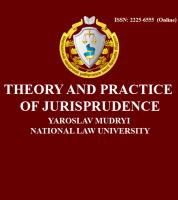Проблеми захисту прав учасників публічних закупівель
Problems of protection of the rights of participants in public procurement
Author(s): Andrii OlefirSubject(s): Law, Constitution, Jurisprudence
Published by: Національний юридичний університет імені Ярослава Мудрого
Keywords: public procurement; tenders; customers; judicial practice; change of the contract on public purchase;
Summary/Abstract: In this article, the problems of protection of the rights of participants in public procurement at various stages of the tendering process is considering. Besides, the legal qualification of behavior of the key actors the judicial practice were analyzed.There were also defined “weaknesses” of the law, on the basis of which customers and participants can abuse with their rights, therefore, in order to eliminate them,we’ve made proposals to the legislation.Historically, the field of public procurement is one of the most corruptive. Experts estimate losses from corruption and insufficient competition in this sphere in the amount of at least UAH 50 billion a year. This is due to a set of factors. Firstly,employees of state-owned organizations, as usually, have no economical interest in saving money. Secondly, public procurement is a large commodity market, which in developed countries makes 10 – 15 % of GDP, and in developing countries – up to 20% of GDP. Thirdly, corruption schemes there are relatively “simple”, the average sizeof which in the medical sector, according to unofficial information, is 5 – 10 % of the contract price, and sometimes it can be limited to a "gift" of stationery goods, etc.Abuse can occur at every stage of procurement and, sometimes, it is difficult to prove their illegality, due to their formal legality. It is so due to gaps in the legislation.I. At the stage of procurement planning there can be determined such abuses:1) violation in determining the subject of procurement: (1.1) excessive details of goods, services and works, establishment of specific requirements that do not result in the customer obtaining logistical or organizational advantages, but can be performed only by a limited circle of business entities; (1.2) unreasonable procurement of works, when the price of the equipment is higher than the cost of the work itself; (1.3) reference in the bidding documentation to a particular trademark, if the subject of the purchase can be described by general features (for example, the purchase of a car). An exception is the cases when the customer buys the belonging for the main thing, for example, in order to purchase a consumable material compatible with a medical product; (1.4) concealing the object of purchase by using improper symbols of classifiers, making grammatical errors, loading low-quality files; (1.5) abstract requirements for a product, work or service.2) violations related to the division of the subject of purchase on lots: (2.1)buying many of lots without a real need for them, though such approach is financially disincentive for small and medium-sized businesses; (2.2) uniting in one lot different commodity groups (for example, medicines and medical products).3) untimely changes to an annual procurement plan, due to gaps in the legislation, because there is no exact time at which plan should be approved as a deadlines for amendments.5) the main violation is a formation of tender documentation for a particular participant or products, for example: - setting the requirements that contradict the law(to provide documents which are not provided by law); - a need to submit unreasonably complex documents (disproportionally long terms or high fees when they are received, which may only be available for large enterprises).6) the requirement to submit some documents by participants in hard copy before the date of the disclosure of tender offers, regardless of the work of the electronic system.7) consolidation in a draft contract of such conditions as to discourage bona fide suppliers to participate in the tender, in particular: - overvaluation of the payment period for delivered products, for example, “until the 31.12.2017” or “payment is made within 100 days from the date of shipment of products”; - installation of complicated delivery terms by the supplier, for example, “the supplier must deliver the products at the request of the customer within 24 hours”; - disproportionately severe penalties and operational sanctions for breach of contractual obligations by the supplier. Such conditions allow the customer to apply them with a “repressive”purpose selectively to certain participants. However, such abusive rights formally meet the requirements of procurement law.Also, violations by customers and suppliers may take place at the stage of procurement or at the stage of execution of the contract.On the basis of the study were proposed the main directions of improvement of the procurement law: (1) to introduce the principle of proportionality of tender requirements to the price and complexity of the subject of procurement; (2) to reduce the thresholds of sub-procurement and to oblige customers to make public announcements on any pre-purchase; (3) to establish the dependency between the bid price and the fee for appealing the procurement procedure to the Antimonopoly Committee of Ukraine; (4) to approve rules for assessing the experience of performing similar contracts by participants, as well as a list of documents confirming the existence of such experience; (5) to approve sectoral standards for the preparation of tender documentation; (6) to secure a clear prohibition on the submission of any documents and information related to the procurement, in writing,before the date of disclosure of tender offers
Journal: Теорія і практика правознавства
- Issue Year: 1/2018
- Issue No: 13
- Page Range: 1-20
- Page Count: 20
- Language: English, Russian, Ukrainian

